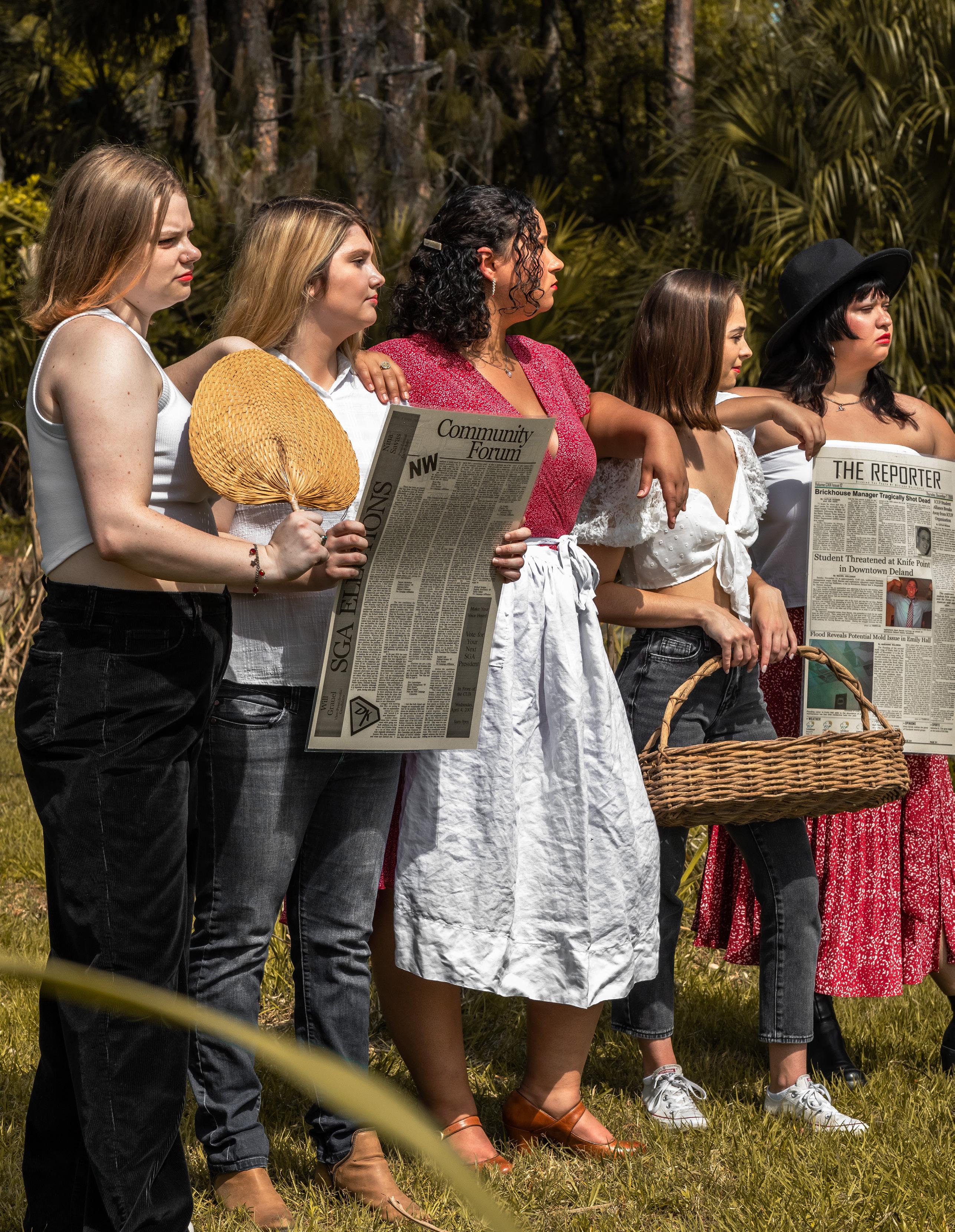




In this, my last issue as the Executive Editor and a Stetson student, I am filled with so many emotions. More than anything, I feel pride at what we have accomplished this year, and of all the hard work this team has done for the sake of serving our community. We’ve come so far as an organization, and I am truly honored to have been a part of the Reporter’s legacy.
This graduation themed issue serves as both a last hurrah for the seniors on our staff and as a helpful resource for graduating seniors and the incoming class of freshmen. We tried to honor the past and emphasize the excitement of a future full of possibilities–things that are sure to occupy the minds of many a Hatter over the next few months.
The end has arrived, and the time has come for me to take my necessary leave. Though my heart aches with the end of my career in The Reporter, I'm seized simultaneously with excitement at the prospect of a new future and a new staff with new visions. I’m proud of our accomplishments, as well as the numerous friends I was able to make by joining our prestigious staff. Steering to this issue, we’ve decided to grant you all with information, tips, and lessons we would’ve loved to gain as incoming freshmen. Though, if you aren’t a freshman, don’t fret, we have plenty of graduation-related information filling these pages for new seniors to peruse. In our own way, we’ve attempted to merge the past and the present for all to see with history galore as we explore The Reporter’s past, the history of struggle meals, and momentous events within the past 23 years. I hope these spark joy in each of you, as well as a willingness to pursue your final years with utmost determination.
Thank you all for reading once again, and remember, every end is indicative of a new beginning. Hope that whichever one it is for you, it’s fabulous. Signing off.
Alexis Diamond, Managing EditorAs for this organization? I leave it in the capable hands of Alis Cadena, your next Executive Editor, and the rest of the very capable executive staff at the Reporter. We can’t wait to see what y’all can accomplish once us old folks get out of your way.

That’s all from me, your friendly neighborhood cripple. Over and out.
 Executive Editor
Executive Editor
It’s been an amazing year. Though y’all are stuck with me one more year, I’m still feeling nostalgic about all the incredible moments this administration has had. This is a bittersweet issue for me as I’m both saying goodbye to many of my friends on staff, and hello to my final year at Stetson. I’m also saying hello to the new e-board of the Reporter though, which is super exciting in its own right.
Even though I’m not graduating right now, I can still identify with this issue’s theme. Things end, then begin again, and the cycle continues. This photo story came full circle as we ended this year the way we started it–with our amazing staff/friends all dolled up and desperately trying to follow my notes for a Reporter shoot. Though this feels like the end of an era, it’s not the end of us. The Reporter will live on long past us, and our stories will be just as bright. I know that all our graduating editors will have a joyful and successful next chapter, and for those of us sticking around, next year is going to be a great one.
Till next time!
Jillian Semmel, Photo Editor

This letter is bittersweet for me. This is my last editor letter as an editor at Stetson, and while I am relieved to be nearly finished with college, I am going to miss my peers and all the important work that we do together. Without Hatter Network, I would not have found the beautiful people and best friends that I know today. I am so proud of all the effort and growth that The Reporter staff have gone through this year. The work they’ve produced has been incredible, and I hope they’re as proud of the outcome as I am of them.
To the upcoming editorial team, I am so excited to see the things you all do. It will be hard, and will require a lot of effort, but the feeling at the end of accomplishment and pride is so worth it. To all the faculty, staff, and students that continue to support us, you do not go unnoticed, and we could not do what we do without you. Thank you.
I am so grateful for Hatter Network and everything it has offered me. Thanks for picking up this issue, and happy reading!
Editor in Chief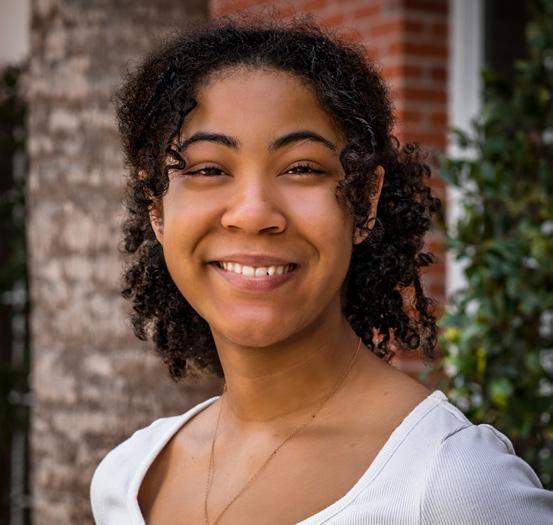




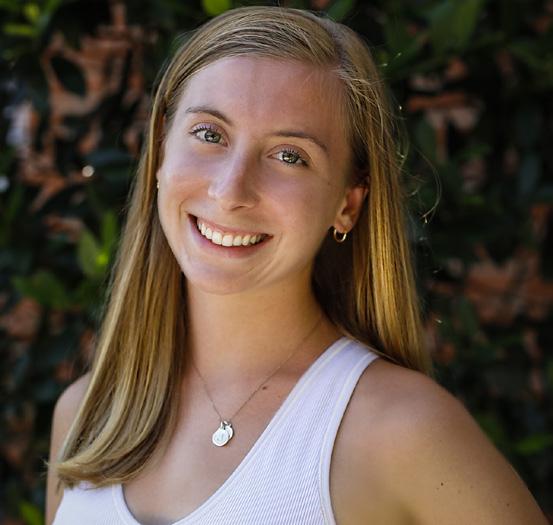


 Xanthippe Pack-Brown Editor-in-Chief
Carmen Cruz Executive Editor
Chase Berger News Editor
Jillian Semmel
Xanthippe Pack-Brown Editor-in-Chief
Carmen Cruz Executive Editor
Chase Berger News Editor
Jillian Semmel
Being in such close proximity to my besties
Xanthippe Pack-Brown, Editor-in-Chief
Hayden Collins, Creative Director
Carmen Cruz, Executive Editor of The Reporter
Alexis Diamond, Managing Editor of The Reporter
Logan Warren, Social Media Director for Touchstone
Jillian Semmel, Photo Editor
Chase Berger, News Editor of The Reporter
Eleanor King, Sports Editor of The Reporter
Venus Turnbull, Creative Staff
Nadia Papin, Creative Staff
Alexa Hutton, Creative Staff
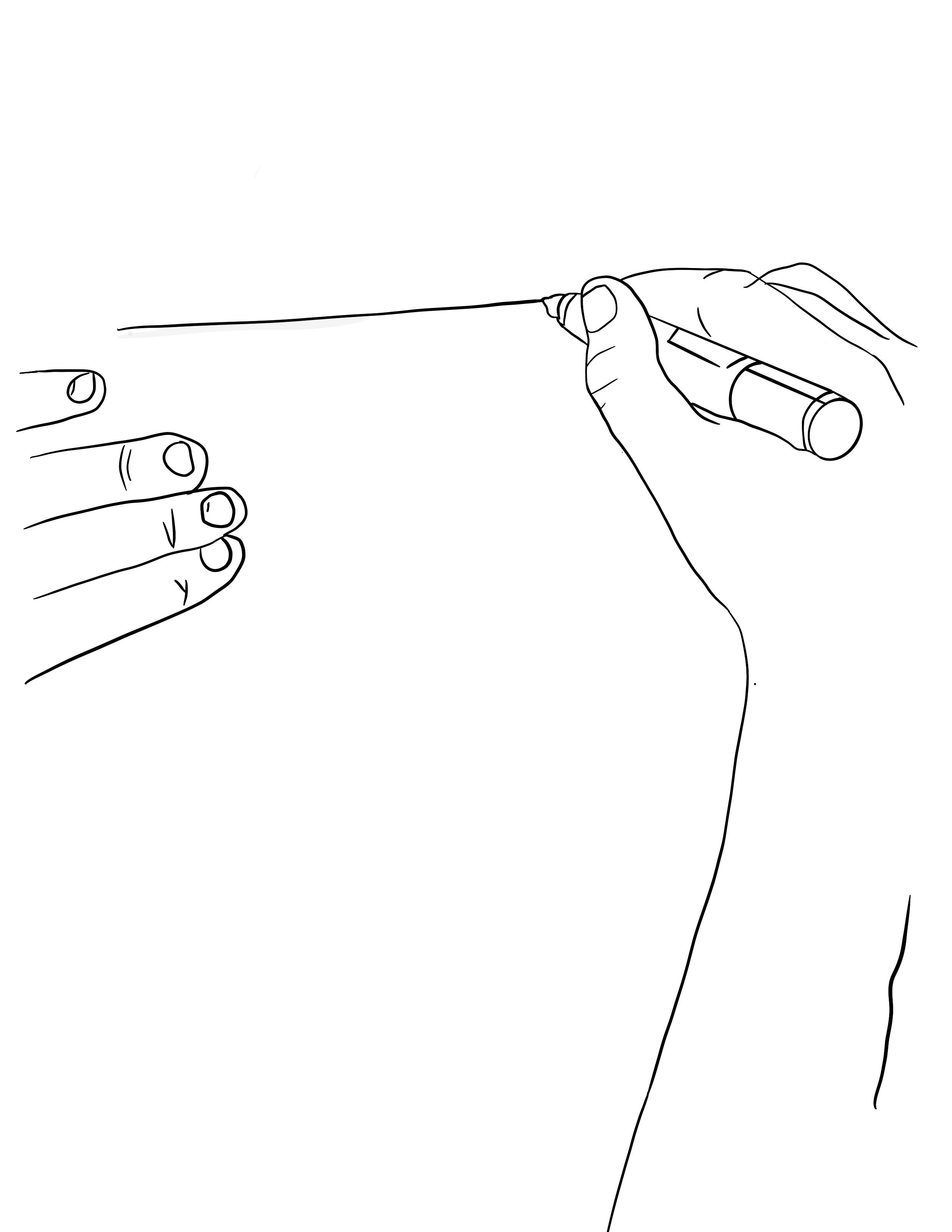
Sisi Small, Webmaster
Bella Steiert, Staff Writer
Brandy Bennet, Staff Writer
Carla M Rosario, Staff Writer
Carlye Mahler, Staff Writer
Cas Bradley, Creative Staff, Photographer
Ciara Kelley, Staff Writer
Hayle Simone Morgan, Staff Writer
Kaelyn-Rose Miranda, Staff Writer
Alis Cadena, Staff Writer
Madison Sepiol, Photographer
Nathan Biagianti,Staff Writer
Jackie Maze, Multimedia Editor
My little family I’ve created




Being a part of Hatter Network!
When it comes to joining Hatter Network, we are never not excited about someone wanting to join our ranks. If you want to write, The Reporter is the place. If you like to appreciate art, music and writing, Touchstone Literary Arts Journal is where it’s at. If you want to create your own podcast, or learn how to use the tech in our radio station, WHAT Radio is there. Hatter Network is an extacurricular media program run by students, for students, to provide them with the information we think they need to know, or an outlet for their creative endeavors. If you’re interesed in getting involved, please email our Editor-in-Chief, Xanthippe Pack-Brown, at xpackbrown@stetson.edu or apply on Engage.
The Reporter, as part of Hatter Network, is the oldest collegiate magazine in the state of Florida. We publish four times per year, twice per semester. Florida Sun Printing prins 300 copies per isue on 8.5 x 11 inch, 80# Gloss Test, Most body text is set at 11 poind Adobe Garamond Pro or Times New Roman with 13 point leading set with a combination of regular, italic and bold. All pages are designed using Adobe Creative Suite Photoshop and Illustrator. For additional information please visit hatternetwork.com. Questions or concerns can be mailed to 421 N Woodland Blvd. Deland, FL 32723 or emailed to hatternetwork@gmail.com.

10 14
18 21 24 26 29 33 37
History of the Reporter by Carmen Cruz
A Walk Through the Archives Into the History of Our Organization
Coming of Age: Across Mediums by Hayle Morgan
The Media that Made Us
2000-2023: The Shared Life of the Class of 2023 by Emily Derrenbacker
The Timeline of the Senior Class’ Collective Memory
The Game of Graduation by Eleanor King and Luke McClatchy
An Inside Look Into Stetson Senior Student Athletes
Struggle Meals Past & Present by Carlye Mahler and Carmen Cruz
How Being Broke is Timeless
Rising in the Ranks by Kaelyn-Rose Miranda
Trading Out the Cadet Ranks for Butter Bars
Artistic Sights and Artisanal Snacks by Carlye Mahler and Ciara Kelley
Arts and Appetizers Through the Αges - Our Study Abroad Journey
Unpacked: The Wisdom Edition by Chase Berger

Seniors Share Their Wisdom With Incoming Newbies






AsFlorida’s oldest collegiate publication, The Reporter has a long and storied history of service and partnership with Stetson University. Interestingly, though, very few Hatters are familiar with this integral part of our history. So, before I bow out of these hallowed halls for good, I made it my mission to take a trip through our archives and condense our thousands of publications for your viewing pleasure. Let’s take a walk.
The oldest surviving publication (that I could find) dates back to 1887, a mere four years after Stetson’s founding. Allow me to do the math for you; that makes our organization a whopping 136 years old at the time of this issue’s release. Back then we were called the DeLand Collegiate, and we printed a new issue each month. The editor-in-chief at the time was “Miss Lizzie Webb,” and an annual subscription would run you 50 cents.
This particular edition featured a story about the much anticipated upcoming break. “The approaching vacation is hailed with joy by the students, who have been poring over their books for so many weary months… What picnics, fishing parties and boating excursions are in reserve for us! And above all, how much time we editors will have for sleep and peaceful dreams in which the business manager will not appear asking for more manuscript!!”
As the updated name would suggest, we began publishing new issues weekly around this time. This administration was led by co-editor-in-chiefs Elizabeth Winegar and Louise McKinney. Subscription prices jumped to a dollar, and a Stetson-themed cartoon and ad followed the title page of new releases.
In addition to student-centered news, poems and cartoonish drawings were also printed. We boasted an impressive sports section back then, and we took care to provide comprehensive summaries of recent scholastic events. Interestingly, our school’s seal was embossed on the front pages.

This marked the first of many special satiric editions that would be released annually, on April Fools Day. It was entirely composed of phony articles meant to surprise and humor its readership. Even the name was a riff on the updated title of our organization: The Reporter.

This edition had articles like “Pope’s Pub to Be Opening Soon” and “Elections Said To Be Fixed.” The tradition was carried on (with a few years skipped along the way) until 2016, which itself featured a tasteful collection of memes and a jorts breakdown. That year (2016) also marked the pivotal moment where The Reporter moved its format from traditional newspapers to magazines.
 1887 – DeLand Collegiate Vol. 1. No. 4
1902 – Stetson Weekly Collegiate Volume XII. Number 7
1986- The Stetson Distorter Vol. 3, No. 1
1887 – DeLand Collegiate Vol. 1. No. 4
1902 – Stetson Weekly Collegiate Volume XII. Number 7
1986- The Stetson Distorter Vol. 3, No. 1
Looking back on our organization’s long and storied history fills me with pride. We have survived over a century of trials and we have overcome obstacles the likes of which few are privy to. I am honored to have had the opportunity to contribute to its legacy, and am equally as excited to see how it evolves and grows once I’m good and gone. So, re-

The last edition that our previous administration produced, and the first where our current administration took a bigger role in production. At the time, it was a headache, plain and simple. We started our transition into more investigative topics here, and swiftly learned that our infrastructure needed to be updated to accommodate that. But despite the schools attempted censorship and a slough of challenges along the way, this issue tackled some important topics that students really care about, and for that (and our determination to stick it out), we can be proud.

We’ve been serving this community almost as long as it’s existed, and we’ll continue to pursue that mission for decades to come.

it’s normal to remark upon how far we’ve come in their life. Whether it be the obstacles we overcame, the laughable gaffs we learned from, the ‘awkward stages’ we had in the midst of puberty, the friends we gained and lost along the way, or the ‘aha!’ moments we had when something finally hit us. With this in mind, it is no surprise that the coming of age story permeates so deep within our popular culture. These sorts of narratives are able to be understood and enjoyed by a wide audience due to how they touch upon universal human experiences of transition and growth.

In the realm of literature, there are so many comingof-age stories to talk about, but I decided on a novel that I think is rather underrated: “The Wednesday Wars” by Gary D. Schmidt. The novel follows Holling Hoodhood, a witty boy who finds himself contending with a complicated teacher-student relationship with homeroom teacher Mrs. Baker, his architect father’s high expectations, and wacky-hijinks involving the class-pets over the course of his seventh grade year.
Besides its S-tier humor, the true meat of “Wednesday Wars’’ comes from its backdrop being the Vietnam War. Schmidt uses Holling’s interactions with the other characters to expose how people on the homefront are affected by the war. We see the war’s exacerbation of anti-Asian sentiment through the racist treatment of Holling’s classmate and Vietnamese refugee Mai Thi, we are witness to the grief and anxiety held by those with loved ones fighting in the war like Mrs. Baker and Mrs. Bigio. We also get a front row seat to the war’s political divisiveness through dinner table arguments where lima beans get thrown between Holling’s father and his hippie older sister, Heather. Through his relationships and interaction with these people, Holling gains a deeper understanding of the world around him and himself as he becomes determined to forge a path for himself.
The cinematic and mythology-inspired “God of War: Ragnarok” picks up some time later from where ”God of War” (2018) left off with Kratos (voiced by Christopher Judge) and his son Atreus (voiced by Sonny Suljic). In Ragnarok, Atreus is no longer just a kid sidekick attached to the hip of his father, but is instead a young adult trying to strike out on his own. Having been revealed as their take on Loki in the previous game, Atreus in Ragnarok is a playable character with his own individual storyline that follows a comingof-age arc with the archer trying to *literally* find his own destiny by looking into prophecies related to the encroaching apocalyptic Ragnarok behind his father’s back, scavenging for pieces of a mysterious artifact with the likes of Odin (voiced by Richard Schiff) and Thor (voiced by Ryan Hurst). And, along the way, he makes friends with the likes of giantess Angraboda (voiced by Laya DeLeon Hayes), Thor’s daughter Thrud (voiced by Mina Sundwall), and Midgardian and future first king of Denmark, Skoldr (voiced by A. J. LoCascio). Atreus’s journey towards self-discovery is not without its grave blunders; he frees the monstrous Hound of Hel, gets deceived by Odin, and unwittingly puts people close to him in harm’s way. Despite this, the game pushes that Atreus needs to be able to step into his own apart from his father and Kratos needs to learn to let go of his son. This message is furthered by examples the game gives us of dysfunctional parent-child relationships that feature a controlling parent being at the root cause of their adult child’s maladjustment. The game’s depiction of Odin is a masterful yet disturbing representation of a manipulative-narcissistic parent who degrades recovering-alcoholic Thor to a sobriety breaking-point in order to maintain his control over him. In another example, we have Vanir Goddess Freya (voiced by Danielle Bisutti) doing all she can to keep up an invulnerability spell that she casted on her son Balder (voiced by Jeremy Davies) that drove him down a path of insanity due to his inability to feel anything. In both of these cases, we see children being denied a certain type of agency by their parents long after they’ve reached adulthood and being negatively affected because of that. “God of War: Ragnarok’’ ends with Kratos giving Atreus his blessing to go leave in search for other giants and the pair share a big heart-warming hug.

Long before the era of “Euphoria,” there was “Degrassi.” “Degrassi” is to teen television what Nicki Minaj is to female rap; they may not have been the first of their kind but those who came after them certainly followed in their footsteps. Starting out in the late seventies, “Degrassi” is a franchise that boasts five different iterations of teen ensemble cast shows. Its most popular iteration, “Degrassi: The Next Generation,” starred the likes of future rap megastar Drake and Nina Dobrev of “Vampire Diaries” fame. In its heyday, “Degrassi” lived up to its tagline of “It goes there,” with many of its storylines touching upon polarizing topics like teen pregnancy, LGBTQ+ issues, domestic violence, sexual assault, and abortion. In fact, a defining moment in “Degrassi,” and probably one of the most relevant due to the on-going mass shooting crisis in America, is of Drake’s character getting shot in the back by a fellow classmate in a school shooting and becoming paralyzed from the waist down as a result. While pushing an envelope that future teen dramas would go on to push even further, “Degrassi” never forgot that the characters were still high school kids, and thus performed a balancing act of having mature melodrama and highschool hijinks.
One of the more recent Pixar films, Disney’s “Turning Red’’ (2022) is about spunky Chinese-Canadian Meilin ‘Mei’ Lee (voiced by Rosalie Chiang) who gains the ability to turn into a giant red panda due to a hereditary curse that affects the women in her family. The film quickly became the center of heavy online discussion when it exploded onto the scene. These discussions ranged from decrying the inappropriateness of the film’s focus on menstruation to claims that the film celebrates kids disobeying their parents to complaints about how ‘cringy’ the film was in its depiction of teenage girls. Much of the discourse around this film was very gendered and that becomes especially significant as “Turning Red,” is the first Pixar feature film to be solely directed by a woman. Domee Shi, the director in question, drew inspiration for “Turning Red’’ from animes like “Sailor Moon’’ and “My Neighbor Totoro,” other comingof-age works like “Wendy Wu: Homecoming Warrior,” real-life red pandas in zoos, and from her own adolescence. Besides Shi, “Turning Red’ had a lot of women working behind the camera, which means that this was made from the female-perspective. More specifically, it was made from the teenage girl perspective as “Turning Red’’ relishes in its display of unabashed girly tweenhood with Mei and her squad of besties obsessing over boybands, swooning over attractive boys, reading trashy vampire novels, beefing with the annoying boys in their class, realizing that maybe you should be more direct with your mom, and directly referencing menstruation by showing pads and tampons onscreen. It is for these reasons that “Turning Red’’ has found itself aggravating some audiences and why it is relevant to what is happening in Florida today. Right now, the federal and Florida government seem to be doing all they can to disempower the younger generations from the banning of books in Florida schools, to Arkansas rolling back laws that protected youth from being exploited, to Congress pushing for a ban on TikTok (used by many young people as a means of organizing politically and getting information on global events not being shown on TV news), to the announcement of a legislative bill in Florida that would ban any discussion of periods in elementary schools. “Turning Red” is a special coming of age tale that imagines an alternative reality that stands in deep and direct contrast to the one being lived in this very moment in time.

“Turning Red” is a special coming of age tale that imagines an alternative reality that stands in deep and direct contrast to the one being lived in this very moment in time.
 Story by Emily Derrenbacker Design by Venus Turnbull
Story by Emily Derrenbacker Design by Venus Turnbull
While everyone in the class of 2023 has lived different lives all over the world and brought their unique backgrounds to Stetson, most of us were born around the same time and are now finishing our college educations in 2023. From birth to graduation, we are united through our shared experiences. Thus, here’s a timeline of all the events, trends, and movements that have shaped the lives of the graduating class of 2023.
Since the tragic attack on the twin towers over twenty years ago, an entire generation was born. This year’s graduating seniors were not only the last grade to be born before this happened, but also the first group to not remember what life was like before. None of us had flown on a plane before airport security was dramatically increased. None of us remember seeing the date 9/11 and not thinking about the tragedy that happened. All of our parents and older siblings remember exactly where they were when the first tower fell, but we were only a few months old.
The first iPhone was released in June 2007. This specific release did not greatly affect the class of 2023 as we were only six or seven at the time, but it certainly altered the trajectory of our childhood. Growing up, the extent that technology controlled our lives was that all the cool kids in elementary school had a DS, and we all played Wii bowling on the weekends. As we got older, we moved from Webkinz to Club Penguin and we listened to music on mp3 players and iPod Nanos. The world changed for us around the time we were entering middle school and it seemed like everyone had an iPod Touch. With the iPod Touch and the new iPhone came Instagram, which effectively created a new world. It seems like as we grew older, our lives became more and more entrenched in technology, but our early years were not quite so dominated by it.

Senior Lisa Jordan ‘23 spoke about the years after it happened: “I remember watching a live video of the twin towers falling in kindergarten, which was crazy.”
For many of us, while we didn’t understand what was happening when the economy crashed in 2008, we felt its impact. It was the months after this happened when we started noticing how our parents were struggling. Now, as we prepare to graduate and enter the workforce, talks of recession and the lingering effects of the pandemic are what concern everyone about future prospects. But these concerns are present among Gen Z more generally.
According to a survey by Deloitte in 2022, “A third of Gen Z respondents worry about the cost of living above all other concerns; 45% live paycheck to paycheck, and just more than a quarter doubt they’ll retire comfortably.”

YouTube was first launched in 2005, but it had the most impact on our lives when we were preteens. Social media was still growing back then, but it was YouTube that gave birth to the rise of influencing as a lucrative profession. This era was also dominated by fangirls. There is no one more dedicated to a cause than young girls were to One Direction, MAGCON, O2L, and other groups.
The 2016 presidential election was probably the first presidential election where we actually understood how politics works. We were only sophomores in high school this year, and all of a sudden it was like we were bombarded with every adult’s opinion. This election was so divisive and was a constant topic of conversation. We became aware of issues like climate change, gun control, and immigration. I think it’s safe to call this election the beginning of Gen Z’s political consciousness. The effects of the 2016 election are still felt today and shaping how Gen Z approaches politics.

The graduating class of 2023 clearly remembers the days between when we found out about the pandemic to when we went home for the semester. It was an odd time, nobody really knew what was going on. Most of us watched as other universities closed and waited for Stetson to do the same. On March 12, President Libby announced all classes would take place online, and one by one students decided to go home to their families while a few remained. When we returned the next semester in the fall, life as we knew it at Stetson was entirely different. We all spent endless hours in our rooms without roommates. Every club meeting and event took place online, and professors and students alike struggled to navigate the new online world. Exposure sent students to hotels. Everyone became tired of hearing the word “unprecedented.” The class of 2023 is the only class left that remembers what Stetson was like before the pandemic changed all the rules.
It’s hard to be thankful for how COVID-19 affected our lives, but I will always be grateful that it didn’t affect graduation (high school or college). Our grade fell into the perfect spot where we enjoyed our senior year of high school and our first semester of college before the world was shut down. But it still affected our college experience. Just as we were settling into college and had finally made friends and joined clubs, we lost all of it.
Stetson senior Lindsey Richmond ‘23 added, “COVID-19 drastically affected my years at Stetson. I saw the lively activity and student life die down to near desertion my sophomore year. I’m glad to see it’s coming back now, but I’m sad that it is as late as my senior year.”
This year’s graduates are the only students left who remember Wendy Libby as president and felt the transition between her and President Roellke. Effective July 1, 2020, three months into the pandemic, Chris Roellke became Stetson’s 10th president. Throughout his time here, students have spotted him crossing Woodland or stopping at tables outside the CUB to say hello. President Roellke has had a very open approach to the job. He has willingly done two interviews with “The Reporter,” and few students would say he’s not present on campus, which is a pleasant change compared to how things used to be.
The graduating class of 2023 is large and diverse. We all didn’t experience these events the same way, and we all had different reactions to them. Despite this, we were all shaped by them. These events covered over 20 years of our lives, but it’s interesting to think about how we will barely remember some of them in another 20 years. Even though after our graduation on May 6 many of us will never cross paths again, in the grand scheme of our lives, we will certainly continue to be shaped by more events and share in that experience.

Student athletes wear many hats during their time in college. Balancing responsibilities on the field with those in the classroom and still adding extracurriculars can be quite the challenge. However, many of our athletes at Stetson are overcoming these challenges everyday and working to make our campus a better place. As our seniors prepare for graduation, let’s take a look inside the minds of some triumphant athletes to discover where they are headed next, what they will be taking away with them from their time at Stetson, and what legacy they are leaving behind.
Upon graduation, Bermudez will have both a Masters in Business Administration with a concentration in Data Analytics and an Undergraduate degree in Business Analytics. His goal is to stay in the world of sports through a sports analytics position. Although he is a transfer from Manhattan College, he will take away the opportunity to play collegiate baseball at Stetson while completing his Masters and hopes to have a conference championship win under his belt at the end of the season. Within his first year as a Hatter, Bermudez has clinched several walk-off wins for the team.
His advice to incoming freshmen?
having the opportunity to learn at the next level.” Bermudez will leave Stetson as a leader who led by example and shared his love of baseball with all of the teammates he had.
While she is still exploring her options, Milano will be attending grad school in the fall to study Sports Management at either UGA or UF. With aspirations to work in professional sports after graduation, Milano wants to work with the college athletics program wherever she attends next, and give back to the next generation of athletes through counseling services. As she moves on from Stetson, Milano takes with her the challenges that helped her grow into the person she is today and the memories she has of being silly, having dance battles, and sharing jokes with her teammates.
To the incoming freshman, Milano shares, “Cherish every moment. It goes by a lot quicker than you think and you never think the day will come when it will all be over. Stay strong and know you have resources to help you throughout your four years at the collegiate level.” Milano leaves Stetson a better place as she advocated for calling attention to mental health in sports, was Vice President of the Sports Business Association on campus, as well as being voted Homecoming Queen.
“It really goes by fast and I wish I could go back and tell myself to live in the moment. Don’t get caught up in the hard adjustments, but keep moving forward and enjoy
After breaking the Stetson 10k record with a time of 31:32 during his final cross country season in the fall, Jakob will be starting as a Tax Specialist with PricewaterhouseCoopers, one of the Big Four accounting firms, after gradua-
“Enjoy your freshman year, both the struggles and successes.”
- David BermudezStory by Eleanor King and Luke McClatchy Layout by Hayden Collins and Nadia Papin

“I plan on going into marketing after college, I actually just got a job offer from Main Street Community Bank. I hope to get onto their marketing team and eventually corporate,” Majeste said. He’s also planning on investing in real-estate in the near future. Majeste cites his time as a student athlete as the reason why he can keep a consistent schedule and structure in his day-to-day life.
“If I could go back to being a freshman or give advice to freshmen, I’d say to just relax, put your work in, and trust the process it will all pay off.”
 - Majeste Hansberry
- Majeste Hansberry
Majeste has a lot of memories from playing for Stetson football, but said his favorite was a practice when the team played on a flooded field. “I think my impact on Stetson Athletics was an example of how hard work pays off. If I can put that work in and see the success I had, anyone can,” Majeste said, further stating, “If I could do it all over again, I’d live more in the moment instead of worrying about what comes next.”

After graduation, Rebecca does not have any immediate plans, but aims to find a rotational program working in human resources or sales in the Southeast. “I’m applying for those positions now but nothing is set in stone, I may take a gap year,” Rebecca said. She cites being a student-athlete at Stetson as the reason she is confident in her time-management skills and her ability to keep a schedule that works for her. “I also learned how to be a part of a team and knowing my role, and just finding my fit really,” Rebecca said. She recalls a sea of fond memories, but definitely had her favorites, stating “I think my favorite memory of being an athlete here at Stetson was my sophomore year. I was in the varsity squad and we made the finals, that was a big deal to me.” Rebecca’s advice to new student athletes is to take time to relax, and realize you will make mistakes but it will all work out how it is supposed to in the long run.
 Rebecca Naser (Rowing/ Management)
Elodie Foster (Tennis/ Psychology)
Jakob McConnell (Cross Country/ Accounting)
Rebecca Naser (Rowing/ Management)
Elodie Foster (Tennis/ Psychology)
Jakob McConnell (Cross Country/ Accounting)
People have been broke for ages and making due with what they had, and they made it out alright. Let’s peer into the past and preserve the present through a brief presentation of struggle meals.

Michigan State University has preserved hundreds of 1930’s cookbooks as a part of its “What America Ate” project. The project's web page describes the reason that they chose to highlight the 1930s since it was a time of “vast economic and social change” during the economic crisis, now referred to as the Great Depression. These recipes come specifically from the St. Patrick Parent-Teachers Association Cook Book (1931)
1 pound veal
1 pound pork
1 egg
Cracker meal
Salt Pepper

Have the butcher chop inexpensive cuts of veal and prok into small squares as for stew. Wooden skewers may be procured from him at no extra expense. Place two pieces of veal on a skewer with a piece of pork in between. Mould to form leg of chicken.



1 cup cooked shrimp (fresh or canned)
2 cups canned pineapple tidbits
Mayonnaise dressing
Lemon juice
If shrimps are large, cut them in halves. Sprinkle with lemon juice and chill thoroughly. Drain and chill pineapple. Combine shrimps and pineapple and mix with well-seasoned mayonnaise dressing. Serve in sherbert or cocktail glasse
Story by: Carlye Mahler and Carmen Cruz2 tablespoons Knox


Sparkling Gelatine.
1/2 cup cold water
2 cups boiling water
1/2 cup sugar
1/2 cup mild vinegar
2 tablespoons lemon juice
1 teaspoon salt
1 cup cabbage, finely shredded
2 cups celery, cut in small pieces.
2 cups carrots, cut in small pieces.
1/4 cup sweet red or green peppers.
Soak gelatin in cold water about five minutes, add boiling water, sugar, vinegar, lemon juice, and salt. When mixture begins to stiffen add remaining ingredients. Turn into wet mold, and chill. Remove to bed of lettuce or endive. Garnish with mayonnaise dressing, or cut in cubes, and serve in cases made of red or green peppers.
and it is the only cookbook preserved in this project to come from Florida. These recipes may seem like odd flavor combinations, or downright inedible to many people today, but knowing what people ate in the past can make us feel more connected to them, and furthermore, allow us to recognize them as real people. Asking questions about why they ate differently than us can quickly lead to interesting historical answers that you might not expect.
Struggle meals are a bit of a staple in my regime, as I’m sure many college kids can relate . I’m always looking to stretch a buck in creative ways so I’m not just eating raw ramen all the time (Uncooked, straight out the bag. Barbaric I know). The following are my favorite dorm-friendly cheap eats that’ll actually fill you up. Bon appetit.

Pretty much exactly what it sounds like. Take your standard peanut butter and jelly sandwich (or switch it up with marshmallow fluff, bananas, strawberries, nutella, or whatever) and pop that sucker in a pan for a few minutes (or a sandwich press or airfryer). The resulting textures will shock and amaze, trust me.
A true classic from my youth. What’s a girl to do when she’s down to the last bits of food left in the pantry? She takes out whatever bready carb is left (tortillas, pita bread, garlic bread, bagels, you name it), and tops it with tomato sauce and pizza-ish accoutrements. Kraft sliced cheese? Sure! Leftover sliced green pepper that just barely passed the sniff test? You bet. This is a true plug-and-play. Be free my children, and leave nothing to waste.
Stay with me here. Follow the instructions on a box of pancake mix, leaving it a little less liquidy than normal, and then pour that goop into a rice cooker. Add whatever you’ve got to jazz it up, or just leave it plain, then let the cooker steam it into a cake that’s socially acceptable to eat anytime. And if you really wanna act up, do this with your favorite boxed cake mix too.
People have been making due in creative ways for millennia, and our generation’s no different. The frustrating and often monotonous task of making a feast on the cheap is a chore, but adding a fun new recipe to the rotation can make all the difference. Try these recipes for yourself, and take heart that the art of the struggle meal has a long and storied history.
After a long four years of undergoing early mornings, strenuous physical training, and learning what it takes to be leader, Army ROTC (Reserve Officer Training Corps) seniors will be commissioned as 2nd Lieutenants in the United States Army. The ceremony will take place on May 5th, 2023 at 10:00 am in Lee’s Chapel where friends and family will gather to celebrate the end of a chapter and the beginning of a new one. One where they trade out their cadet ranks for butter bars—a term used often to reference a 2nd Lieutenant because, as funny as it sounds, their rank insignia ironically looks like one.
New 2nd Lieutenants will oversee platoon size units consisting of a platoon sergeant and two or more squads; approximately 16-44 soldiers. The AROTC program allows cadets within the four years they are in the program to practice being in leadership roles so they can be prepared to take on the responsibility of being a platoon leader. Even though everyone will have different jobs in the Army, ultimately every newly commissioned officer will have the same roles and responsibilities. Those responsibilities entail leading, planning, and making decisions in high-pressure environments.
(LTC) Lieutenant Colonel Reitano said. “A lot of times we see retired grandparents or parents come back and give their son or daughter the oath.”
The powerful message they recite is a vow that they will protect and defend the Constitution of the United States.
Throughout the ceremony, many customs and traditions must take place. To start off the event, everyone stands to sing “The Army Goes Rolling Along” and the National Anthem. The lyrics of “The Army Goes Rolling Along” tells the history of the Army’s victories and brings pride to those who have served their country and to those who are currently serving their country. It is expected that every soldier sings it proudly. After that, a guest speaker, who is normally a retired officer, offers words of encouragement and advice. Finally, to close things off, cadets will recite an oath to their country which secures their entry into the Officer Corps. Following the oath, friends or family members pin the 2nd Lieutenant rank on the shoulders of the newly commissioned officers.
“During the Oath of Office, each cadet will recite with someone they choose who can be an officer in any United States military branch,” Professor of Military Science
Another part of the ceremony directly after the oath and pinning is the first salute. This is where an enlisted soldier gets to come and salute the young Lieutenant for the first time in a ceremonial fashion. They usually present them with a half dollar afterwards to acknowledge and give respect to their new rank and position.

For me, commissioning signifies the growth and maturity I’ve gained up to this present moment and helps me reflect on how far I've come to get to that point."”
- Waverly Mayo (‘23)
"My oath is going to be my father. I look up to him a lot so for him to give me that oath means a lot."
- Eric Sangtiago (‘23)
What’s special about commissioning and going through the ROTC process is that you are guaranteed a full time or part time job after college. Cadets have gone through military science classes, physical fitness tests, completed and passed Advanced Camp at Fort Knox Kentucky over the summer, and much more to get to this point.
Going into the ‘Big Army’ is a highly anticipated milestone. Many cadets are looking forward to moving onto their first duty stations, where they will actually be doing what they love most: leading. But before doing so, they must graduate from what is called the Basic Officer Leader Course. Santiago received active duty and will be going to Basic Officer Leader Course (BOLC) in July to complete a core component of training at Fort Lee Virginia, which is the home of quartermaster school. BOLC gives new 2nd Lieutenants skills and understanding as to how to make an impact as a leader while also giving knowledge about what their job entails.
A quartermaster in the Army is someone who oversees and ensures all equipment, materials, and supplies are available and working for missions. They play a key role in supporting the soldiers who work out in the field. Even after commissiong, the desire to be great never stops. With characteristics such as discipline, resilience, and courage, nothing can get in the way of climbing up the ladder to success.
“It takes somebody to have the will and desire to do it [ROTC & Army],” LTC Reitano said. “It’s not something that’s so hard to get to but it requires effort by the individual to want to do it. Nobody wakes up in the morning and says, ‘I want to do a 12-mile ruck march’, that’s not common. But for someone who wants to serve their community and nation it’s easy for them to do it.”

 Artisanal
Written by Carlye Mahlerand Ciara Kelley
Artisanal
Written by Carlye Mahlerand Ciara Kelley
Studying abroad can be daunting, especially when the main focus is art. Most students find themselves gravitating towards different aspects of the travel, whether it be the sites, the shows, or even the sips. Though, during most study abroad trips, students are tasked with spending hours in museums each day, and when you are not quite sure what you are looking at and why, it can feel like you are lost in more ways than one. As recent travelers ourselves, we aim to provide any aspiring study abroad student with a crash course introduction to some of the most influential artistic periods and artisanal eats using our own experiences after the London and Paris study abroad course. Thus, we paired the knowledge of art we gained with some historical hors d’oeuvres for you to enjoy!
Heard of the Mona Lisa? Then you have definitely dabbled in some Renaissance art. With its most popular works being attributed to artists like Leanardo da Vinci and Michelangelo, the Renaissance Period provides a plethora of popular pieces still referred to in and out of the realm of art today. Roughly dating from the late 15th century to the mid 16th, the Renaissance embodied cultural rebirth. The heavy focus on ideas of realism and human anatomy is showcased by the paintings and sculptures of the period. And even though the era spearheaded a new rebirth, many of its artworks still depicted traditional biblical scenes, demonstrating that there was still a strong sense of tradition at least in subject matter. Some famous works include The Birth of Venus (1484-1486), The Last Supper (1495-1498), and The Arnolfini Portrait (1434).

Following the Renaissance came the Baroque period. This era of art moved away from more traditional depictions of Christ and biblical scenes, instead highlighting the power of mankind. To counter the Renaissance, Baroque artists focused on irregular, exaggerated, and dynamic imagery in their work, which is why many people still use the term Baroque to mean bizarre. Peter Paul Rubens, Caravaggio, and Diego Velázquez are some of the most notable artists from this period known for their dramatic, lavish scenes. The Calling of St. Matthew (1600) and Portrait of Innocent X (1650) are two popular Baroque paintings still referenced in art classrooms today.
Around the close of the 18th century, the next period of art took shape: the Romantic era. Contrary to its name, the Romantic period was not all lovey-dovey romance, but it did mark a large shift towards sentimentality in art. In an effort to move away from ideals that ruled the previous periods like reason, Romantic artists celebrated a new way to view the world. Through an emphasis on feeling and the subconscious, art became much more imaginative. Most artists from the time may not be as well-known as those from other periods, but the works of Henry Fuseli, Eugène Delacroix, and many others exemplified the movement towards emotion and sensation taking importance over older Enlightenment ideas, such as reason.
After Romanticism opened the door to more imaginative, derivative work, the late 19th century marked the birth of Impressionism. Still one of the most popular artistic periods to date, the Impressionist era was centered around expression and full abandonment of traditional colors and practices. Vincent van Gogh, Claude Monet, Camille Pissarro, and several others are famed for their style and Impressionist techniques. Many artists shifted their focus to natural scenes, capturing the complexity of the outer world without sacrificing bold colors and lighting. New and expressive paint application was also introduced in the period emphasizing thick, confident brush strokes and stippling. The techniques forced artists and viewers alike to leave behind the concept of realism, instead focusing on the bigger picture rather than up-close detail.
Even within Impressionism, artists sought to break more boundaries in their art. A lot of the same artists that helped to lead the Impressionist era, like Paul Gauguin, Vincent van Gogh, Paul Cézanne, broke away from the limits of Impressionism to create work in a new Post-Impressionist period. Many aspects of Impressionism remained in practice, but Post-Impressionism built upon the vibrant colors and bold mark-making in an even more exaggerated and personal manner. Artists chose to pursue more personal subject matter and rejected the limitations of basic outdoor scenes commonly portrayed in Impressionism. There was a growing interest to create art in solitude and produce more spiritually expressive works as opposed to naturalistic approaches.

Chèvre rôti sur toast et salades vertes (Goat cheese on toast served on salad) from A La Petite Chaise. This earthy, buttery, goat cheese is from the oldest restaurant in France. It was made famous for being a meeting place for some of the great minds of the time such as George Sand, the French novelist, mirroring the development of ideas that the Renaissance period is known for.
Passionfruit macaron
Nothing says “man-made” like a macaron. The use of fruity flavors in such a delicate pastry is an exercise in excess. Much like the ornate and beautiful wealth of the Baroque art however, it manages to balance it beautifully.
Chocolate croissant
Something about the flaky layers of a French croissant just feels romantic. Whether it’s the corny tourist in us or the French foodie, they just feel Romantic.
Prawn cocktail potato chips (Walkers brand)
Hear me out! Up close these flavors make very little sense to the American palate, but once you back up and enjoy the bigger picture of the flavors, it creates something beautiful.
Dill and beetroot salmon gravlax, lemon and yuzu cream
Leaning into the emphasis on color and line, this beautiful plating mirrors the post-impressionist love of bold brush strokes and colors that pop.



 Story by Chase Berger Design by Nadia Papin
Story by Chase Berger Design by Nadia Papin
stress, stress, and more stress. However, they also gain a well of wisdom that may have been untapped had they not made the choice to take the path they did. While this wisdom may be difficult to obtain, it is certainly always worth it in the end. But here, you do not need to overcome a grand obstacle or jump a giant hurdle to gain knowledge. Four graduating seniors have agreed to talk about the biggest obstacles of their disciplines and the knowledge they gained. Now, they’ll unpack their wisdom and pass it on to you.
Gonzalez is a Vocal Performance major. He is a member of the American Choral Directors Union and a program lead for the Stetson Young Singers: a community-based children’s choir hosted by the School of Music. He also works as a collaborative pianist and vocal coach with his colleagues, in addition to being the Lead RA of the First Year Area.


“My biggest obstacle was learning to overcome self-doubt and be willing to take risks. I didn’t get this far by being timid, so there’s no reason to start now. I’ve found that when I put everything I have into a performance, it ultimately makes for a better show, but it’s hard to take that leap psychologically. Related to that, another major challenge for me has been getting over my apprehension towards embarrassing myself. However, the School of Music has given me ample opportunities to make a fool of myself in front of tons of people, so I’m desensitized to the fear of failure and subsequent embarrassment. It ultimately gives me the freedom to open up on stage,” Gonzalez said.
“I’d advise all of my less-experienced colleagues to keep trying new things, and to never turn your nose up at an opportunity just because it’s foreign to you. In addition, get good sleep. You can do anything if you get enough sleep. Otherwise, you will catch the Presser Plague.”
Berman is a Studio Art major. While they aren’t involved in any major -related extracurriculars, they are part of the Hatter Band and Pep Band. They find joy in performing with their peers and being able to play an instrument like they did in high school.
“One of the most difficult challenges I faced while being a part of the program was maintaining the motivation to complete my assignments in a timely manner. As someone who struggles with their mental health, I often lack the energy to finish complicated tasks by the time they need to be finished. However, I am usually able to communicate these struggles with my professors and collaborate on a solution regarding this problem. I had a very difficult fall semester this school year due to personal reasons, and by the grace of my professors, I was granted much needed extensions on assignments which wouldn't be possible if they weren't as understanding as they were.”

“The biggest piece of advice I can give to any incoming visual arts major is to make sure you have a hobby,whether or not it relates to the arts. Being an art student can be very mentally draining with the numerous assignments we need to turn in, so being able to have something fun to do on the side really helps with keeping oneself from going into burnout. Another piece is to not forget to make art for yourself sometimes. School is going to make it so that the majority of the art you make will be graded, and while you might enjoy making those pieces, it’s still important to make art that you actually enjoy making—art made without the fear of being judged
or even art without a clear meaning or direction. Lastly, your artistic ability does not define you as a person. There will be students who are better than you at making art and that’s okay, bettering your abilities is not a competition and should never be treated as such. Everyone starts from somewhere and learns at different speeds, so don’t beat yourself up if your painting doesn’t look as good as the next guy’s. That being said, there will also be people who aren’t at the same level as you, and that’s okay too. They’re learning at their own pace and the best thing you can do is offer them advice if they wish. We’re all in this together and we should all strive to help everyone succeed where we can,” Berman added.
Hassebrock is an Environmental Science major with minors in Chemistry, Public Health, and a Certificate of Community Engagement. Besides being a tutor at the Writing Center that specializes in scientific writing, she works as a Conservative Science Intern at the Marine Discovery Center through the Bonner Program.

“I think the most difficult challenge at first was balancing a heavy course load, multiple jobs, and personal commitments. Oftentimes, exams in my STEM classes would fall on the same day or week so I had to learn how to prioritize my studying while still meeting my work and personal obligations. I think the most helpful thing for me to be able to do this was to have a very detailed planner with time set aside to study for each class. Even with my planner, there were still times where it felt overwhelming, but effectively managing my time has helped reduce how often I feel that way,” Hassebrock said.
“My advice for underclassmen would be to utilize your professors’ office hours. The professors at Stetson have a wide range of experiences and they truly enjoy helping students, so if you have a question, just go and ask them! Dr. Anderson, my academic advisor and professor, has been incredibly helpful over the past four years with everything ranging from choosing classes to finding scholarships and now to graduate school applications. I really recommend just dropping by during your professor’s office hours and asking some questions!” Hassebrock added.
“I really appreciate my professors for being able to work with their students when it comes to personal struggles and being able to work out ways for them to be able to academically succeed.”
Sessa is a double major of Business Administration and Sales with a minor in Marketing. He is heavily involved in Greek life as a member of Delta Sigma Phi and former President of Interfraternity Council. On top of that, he participates in intramural sports, including basketball, football, soccer, softball, and volleyball.

“One of the most difficult obstacles I encountered was definitely adjusting from a high school work-level to college work level. I feel that this should never be overestimated, and you should be prepared to bust your butt from day one. I didn’t have much of an issue with this, but it definitely required a change of thought,” Sessa said.
“My advice for underclassmen in the business school is to be a sponge. I had a very influential person in my life say this to me and it completely changed my perspective on my teachers and faculty.”
“Be a sponge in the sense of taking in as much knowledge as you can. Use your teachers to your advantage to further yourself in your knowledge spectrum. Knowledge is power.”
“ Once this resonated with me, it started opening more of my doors to question asking and conversation which has helped me tremendously along the way,” Sessa added.
The experiences of these seniors echo many of my own, as I’m sure they do with most graduates. My hope is that you take at least one piece of advice from this edition of “Unpacked” and are able to apply it to your undergraduate experience. As a university student, it is easy to become overwhelmed and have the urge to either shut down or overextend yourself. College is a new experience and people either freeze or try to do too much. My advice to you is to find a happy medium for the perfect balance. Forcing yourself out of your comfort zone is essential to succeeding in life and college is the perfect opportunity to do so.
However, if you continue to push yourself, you might take on too much and end up burning out, which is not good either. To find a balance, say yes to new opportunities but be conscious of your other responsibilities. Remember to make time for yourself and your own wellbeing. You do not have to do everything today; there will always be tomorrow. However, at the same time, you cannot always do nothing, for tomorrow will not wait.
One day, it will be you graduating and passing on your wisdom, and I hope that the wisdom you collect is worthwhile.
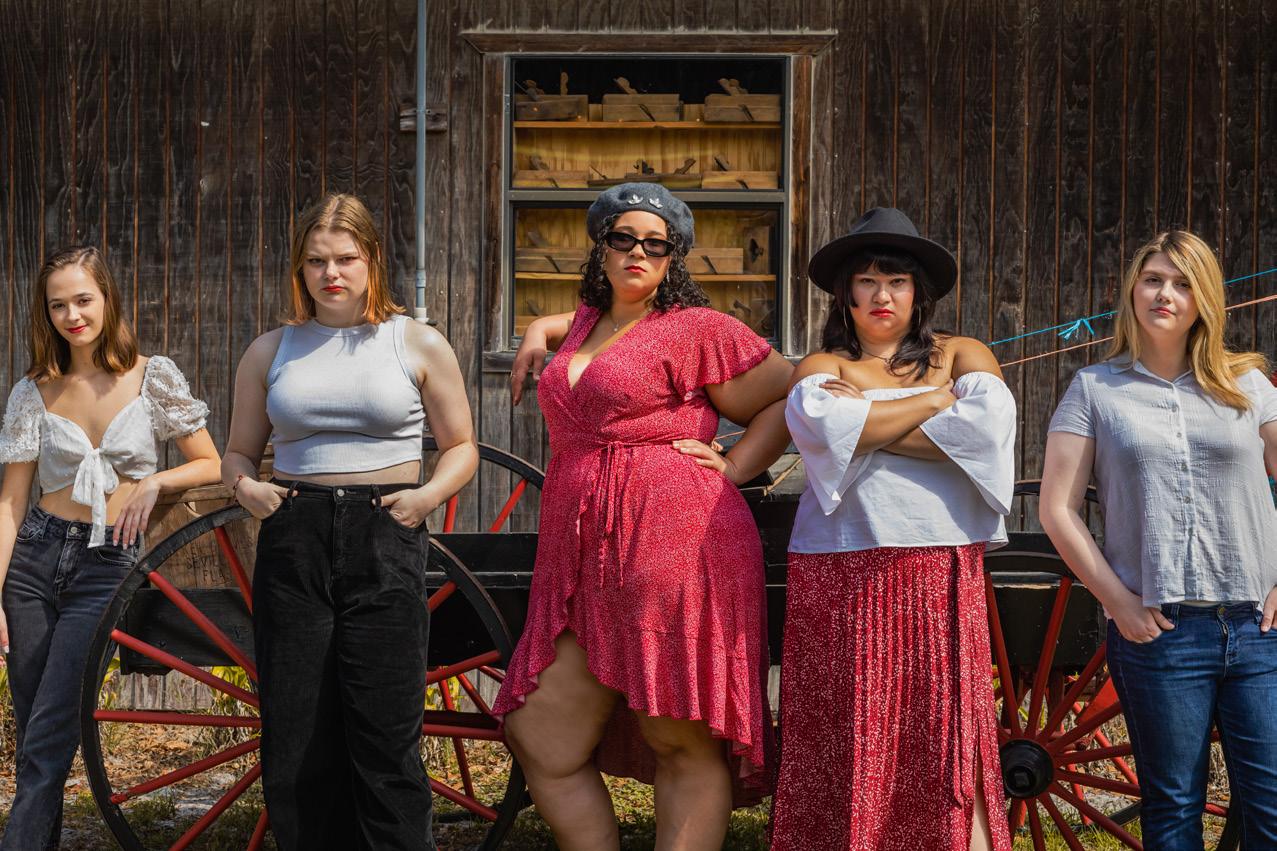
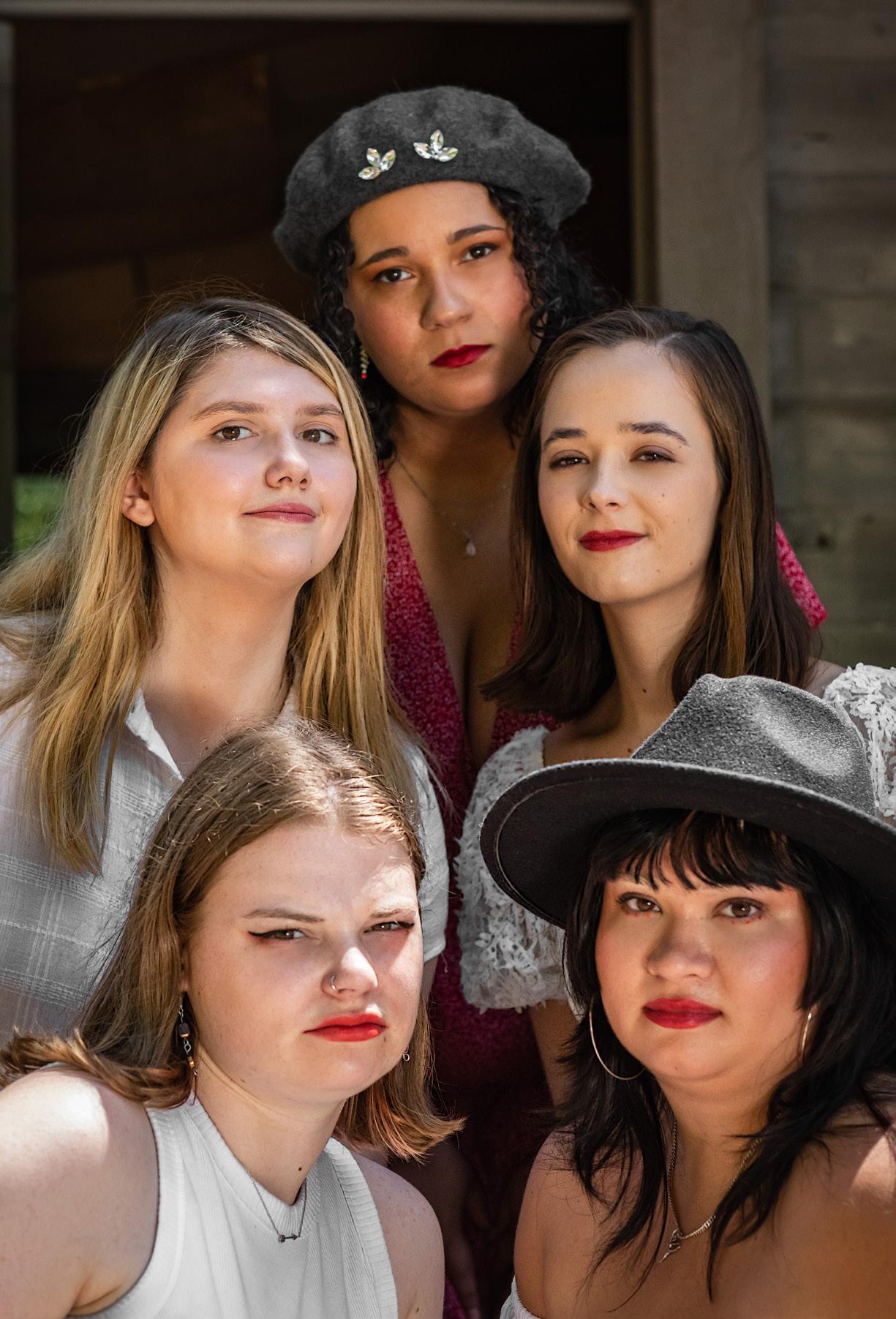
We wanted to make this grad shoot unlike any other. I didn’t wanna bother with the same old cap and gown champagne motif, I wanted to take that concept and make it more abstract and interesting. So, we took the theme of “graduating” and used it to put our senior staff in a fish out of water concept. We put them in modern clothing, but a dated background. Graduating is all about appreciating the past while looking forward to the future. We wanted to focus on growth and renewal rather than on the finality of the college experience itself.
This shot came with a lot of grief from the gang. Their varying heights and patience levels meant for a long shooting process for this particular photo. I really wanted to get a tight closeup of our orgs leaders without a lot of background noise. What felt like an eternity made for a great visual. See guys? I told you so!
Layout: Venus Turnbull
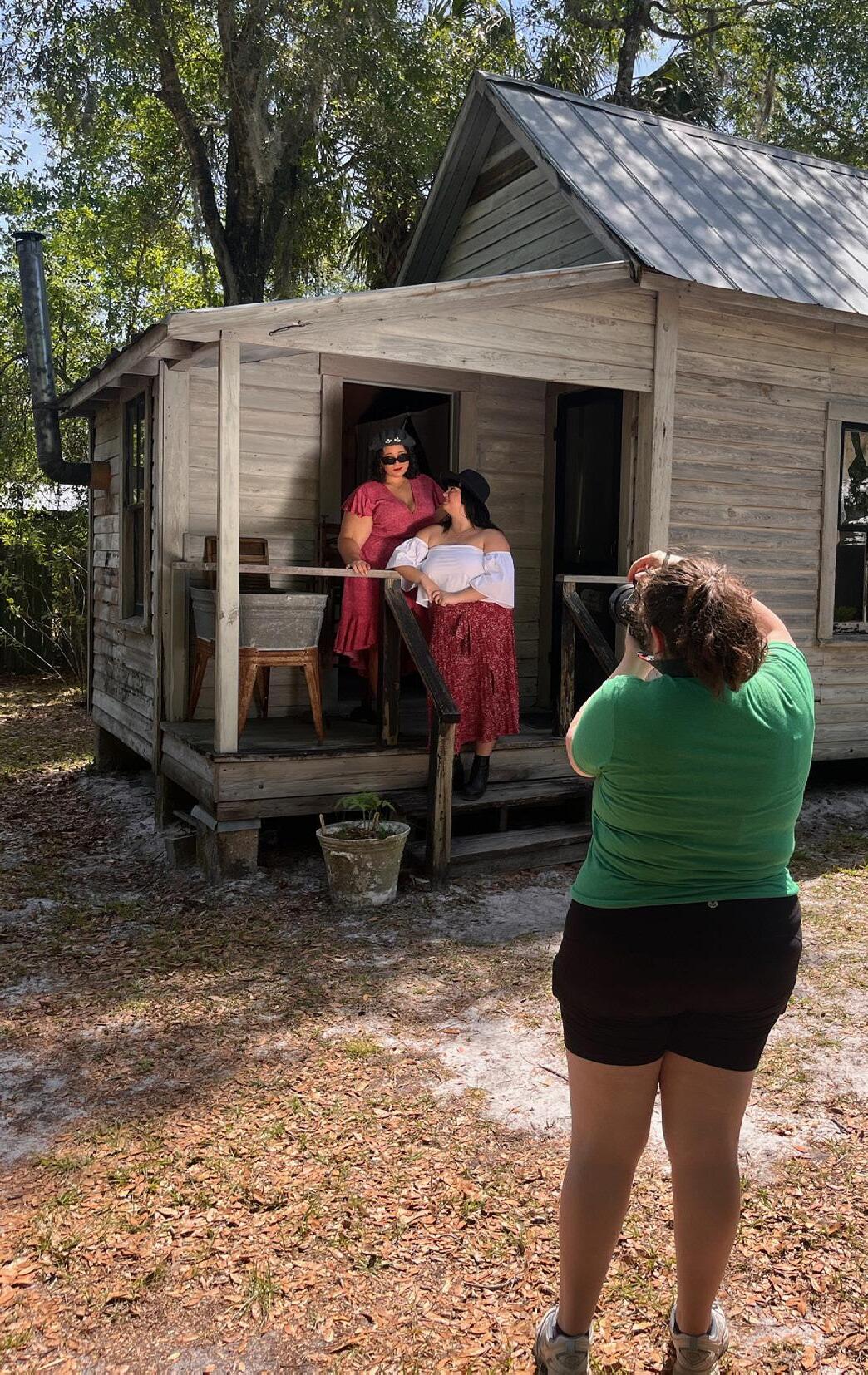
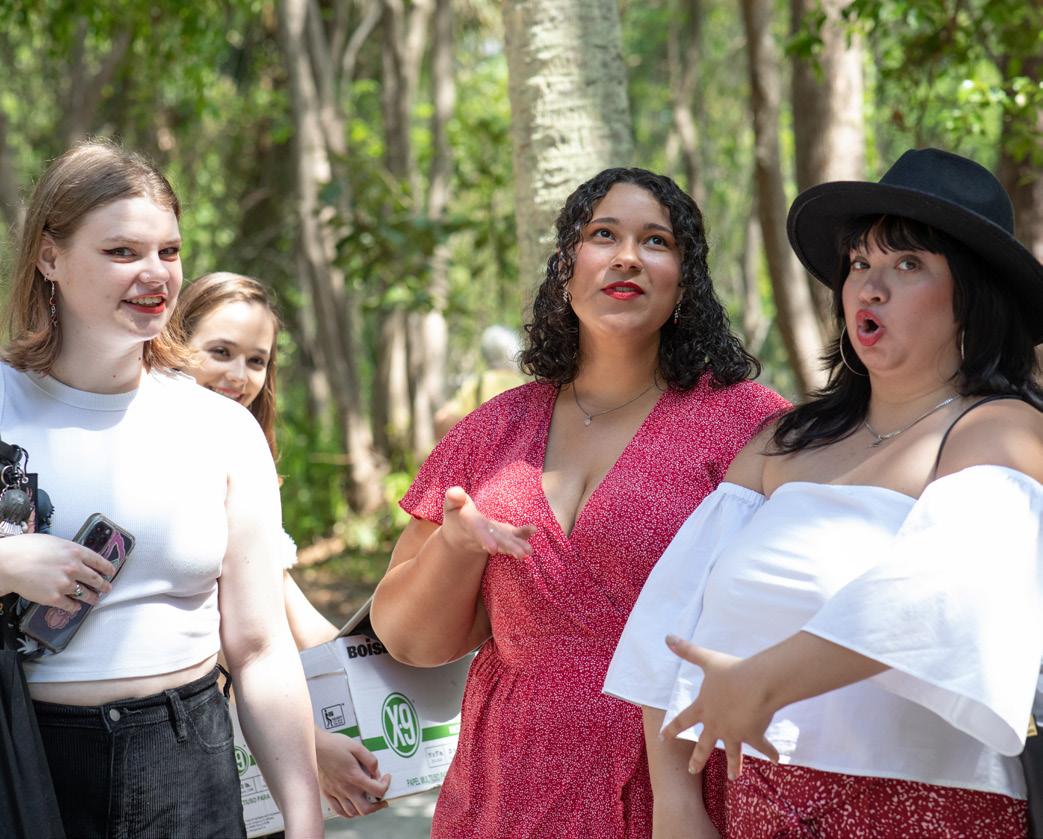
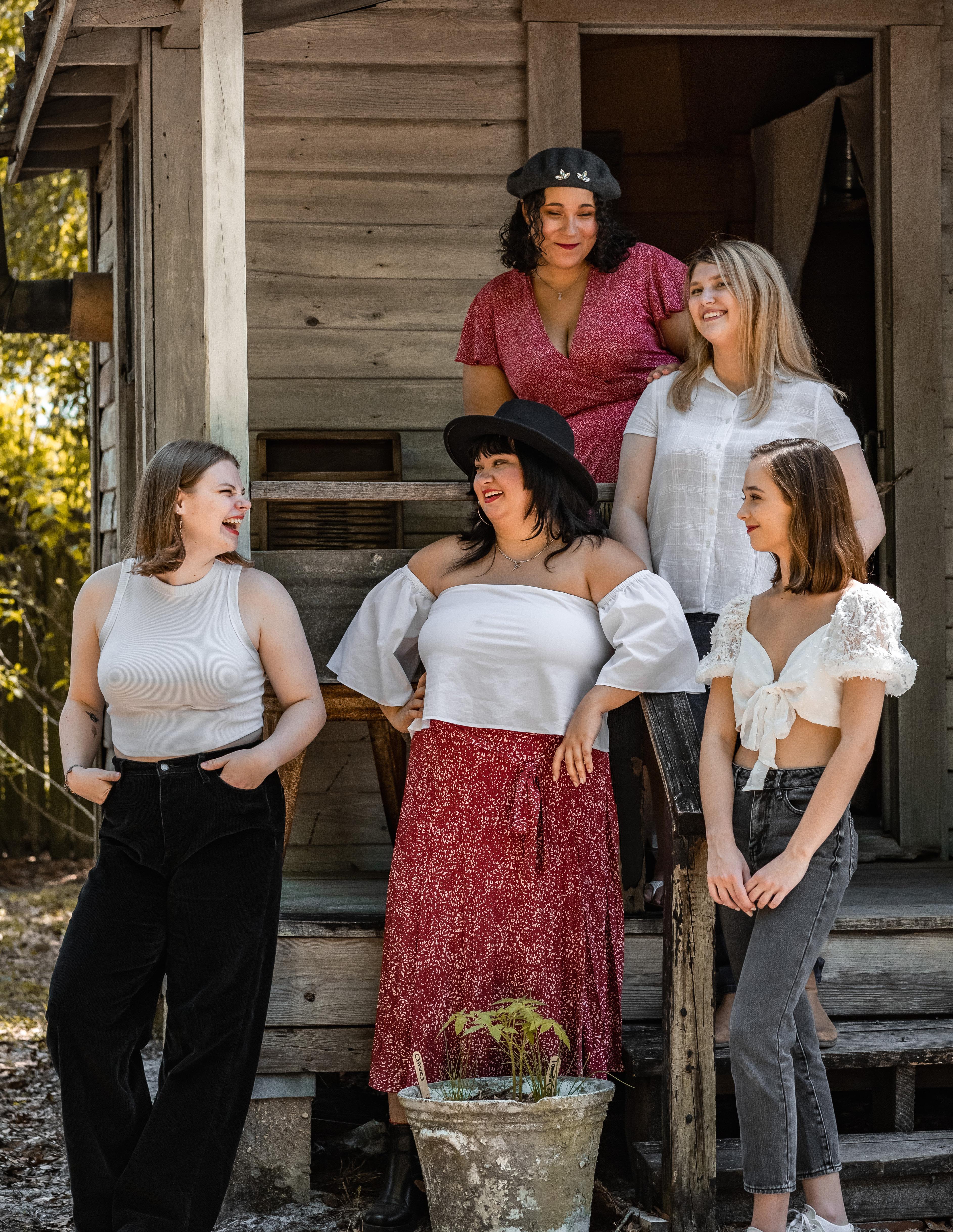



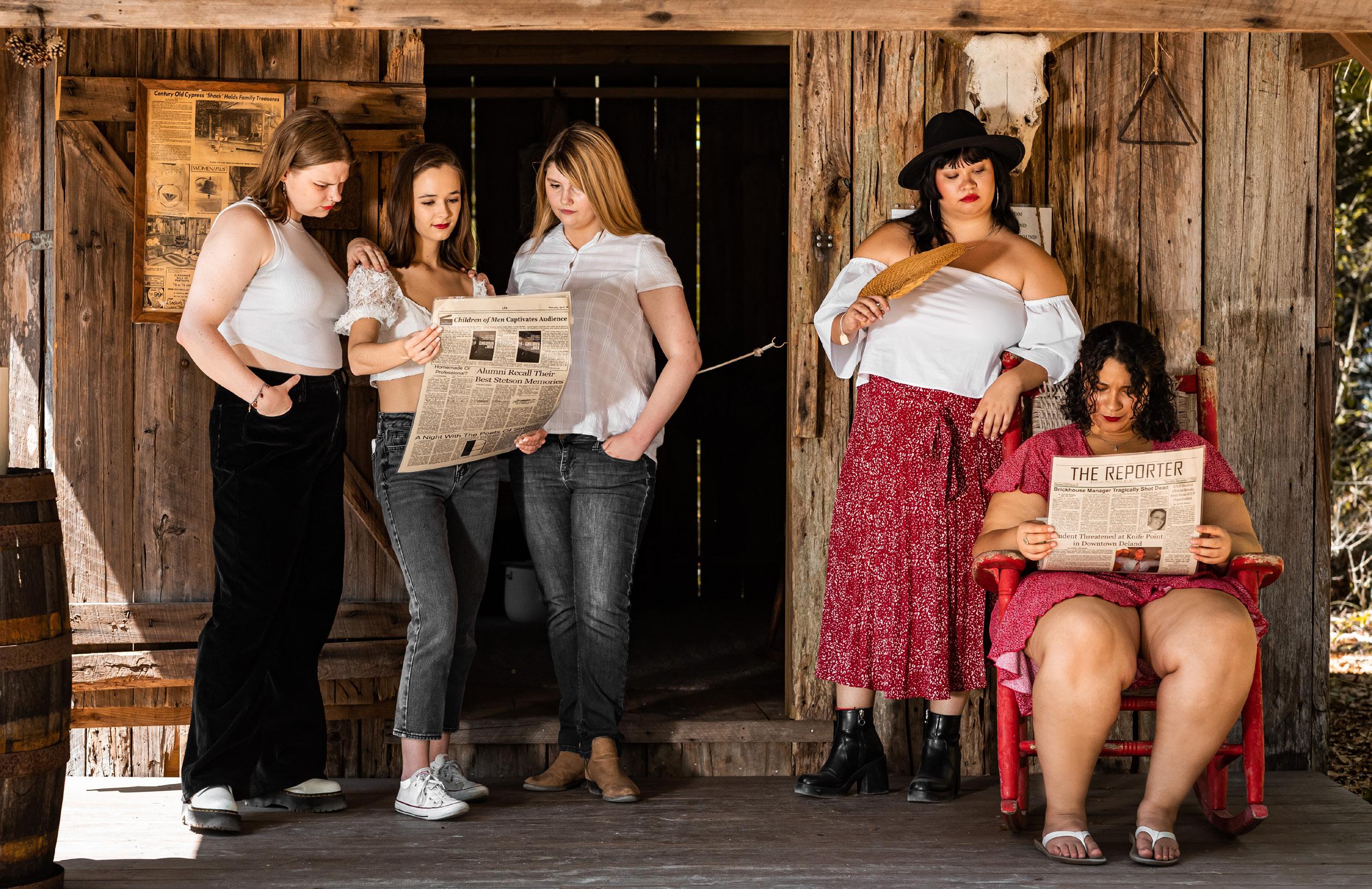

Don’t Mess With Me (while I’m Jellyfishing) - YourBoySponge
It’s Corn - Tariq, The GregoryBrothers
Legs - Lucian Piane, Myah Marie
Call Me Mother - RuPaul
Nails, Hair, Hips, Heels - Todrick Hall
Sissy That Walk - RuPaul
Kissing Toads Again - Jan Two-Sleeves
His Cheeseburger - VeggieTales
The Home Depot Beat - Home Depot

MEGALOVANIA - Toby Fox
Anime Thighs - Mc Virgins, wonder
Blicky - Fresh x Reckless
Yoshi Commits Tax Fraud - Isaak
There’s a Platypus Controlling Me - Dr. Doofenshmirtz
Fabulous - Phineas, Bobby Fabulous
Peepeepoopoo - BeatsBoomingBang
Oki Doki Boomer - SenzawaMeme
Obama Prism - Iceboy Ben
Jesus Is The One (I Got Depression) - Zack Fox, Kenny Beats
Uh Oh Stinky - LLusion, Egg

Ghost Choir - Louie Zong
Coconut Mall - Arcade Player
Welcome to The Internet - Bo Burnham
On the Floor - IceJJFish
Never Gonna Give You Up - Rick Astley
We Don’t Talk About Bruno - Cast of Encanto
Fergie’s National Anthem - DJ Suede The Remix God
Fergalicious - Fergie, will.i.am
Kickapoo - Tenacious D
Toad Sings the Star Spangled Banner - Toad
